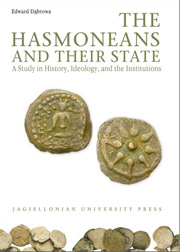Book contents
- Frontmatter
- Contents
- Introduction
- Abbreviations
- Part I Judea under the Hasmoneans (167–63 BCE)
- Part II The Institutions of the Hasmonean State
- I The Ruler
- 1 The Royal Priesthood or the Priestly Monarchy
- 2 The Priesthood
- 3 The Kingship
- 4 Succession
- 5 The Royal Family
- 6 The Court
- 7 The Capital City
- 8 The Palace and the Baris
- 9 Propaganda and Self-Presentation
- II The State
- Part III Society
- Conclusions
- Bibliography
- Index of Personal Names
- Index of Place Names
- Index of Ancient Sources
- Electrum - Volumes Published
- The Hasmonean State
6 - The Court
from I - The Ruler
Published online by Cambridge University Press: 05 September 2014
- Frontmatter
- Contents
- Introduction
- Abbreviations
- Part I Judea under the Hasmoneans (167–63 BCE)
- Part II The Institutions of the Hasmonean State
- I The Ruler
- 1 The Royal Priesthood or the Priestly Monarchy
- 2 The Priesthood
- 3 The Kingship
- 4 Succession
- 5 The Royal Family
- 6 The Court
- 7 The Capital City
- 8 The Palace and the Baris
- 9 Propaganda and Self-Presentation
- II The State
- Part III Society
- Conclusions
- Bibliography
- Index of Personal Names
- Index of Place Names
- Index of Ancient Sources
- Electrum - Volumes Published
- The Hasmonean State
Summary
Evidence concerning Hellenistic kings contemporary to the Hasmoneans provides much detail about their entourage, an inseparable part of their status. It was composed of not just family members, but also the king's numerous ministers and aides, officials of different levels, and servants. The entire community, with its hierarchies and structured functioning, fully deserves to be called a court.
Among members of the royal court, a place of honor belonged to members of a select body of advisors closest to the king whom Hellenistic nomenclature described as “friends” (οι φίλοι). Their rank in court hierarchy was indicated by the honorary titles they were awarded by the ruler. It was from the circle of the king's “friends” that usually were selected ministers, generals, and chief diplomatic envoys. Also, they made up part of the king's council, supporting the ruler with their knowledge and experience in making essential state decisions, whether in domestic or foreign affairs. Without their counsel, some kings could not bring themselves to take important decisions. Being included among the king's “friends” was a great honor as it afforded unlimited access to the king. It also bestowed personal prestige as well as ample material gains in land and occasional gifts. However, risks were there, too: a change on the throne might mean loss of influence and privileges for existing members, perhaps even loss of life; but then again, it could bring new honors and promotion. Regardless of what actual influence on affairs of state that group of officials had under the various monarchs, in the Hellenistic era the presence of such a body at the king's side was a matter of course.
- Type
- Chapter
- Information
- The Hasmoneans and their StateA Study in History, Ideology, and the Institutions, pp. 126 - 129Publisher: Jagiellonian University PressPrint publication year: 2009



